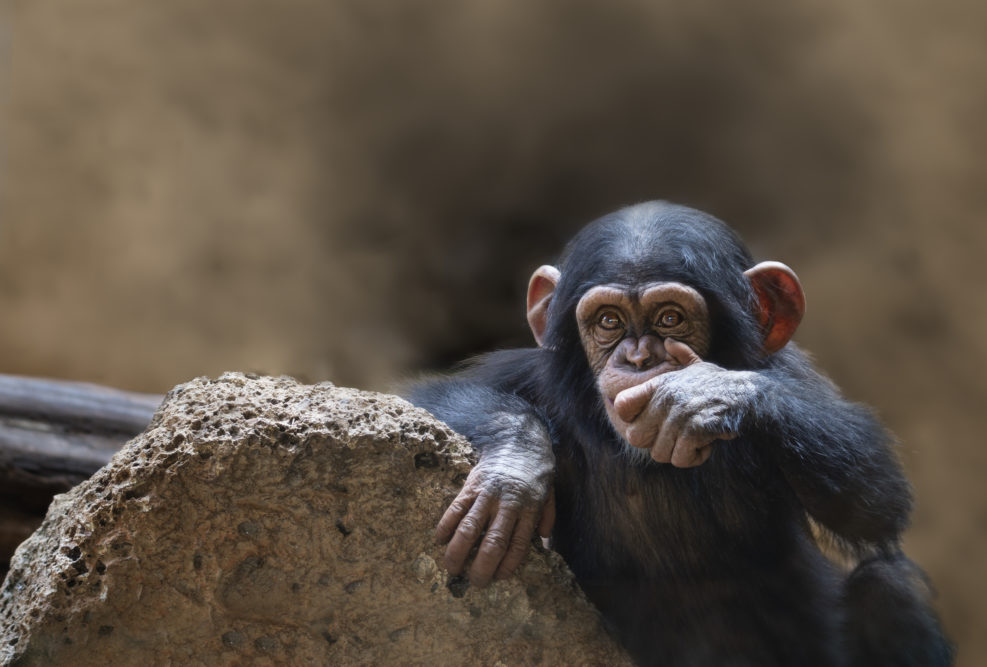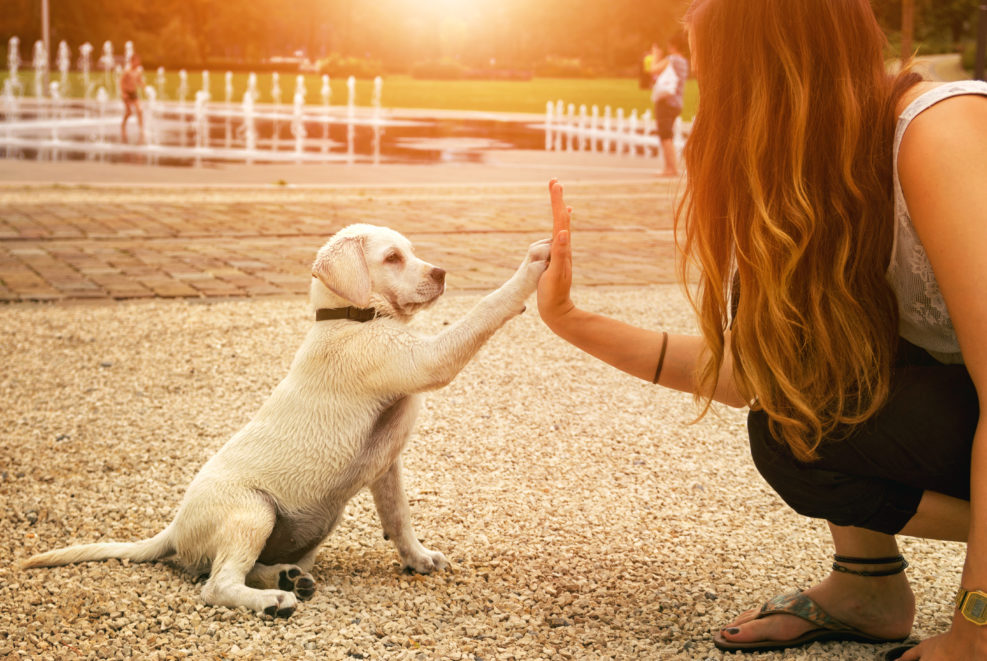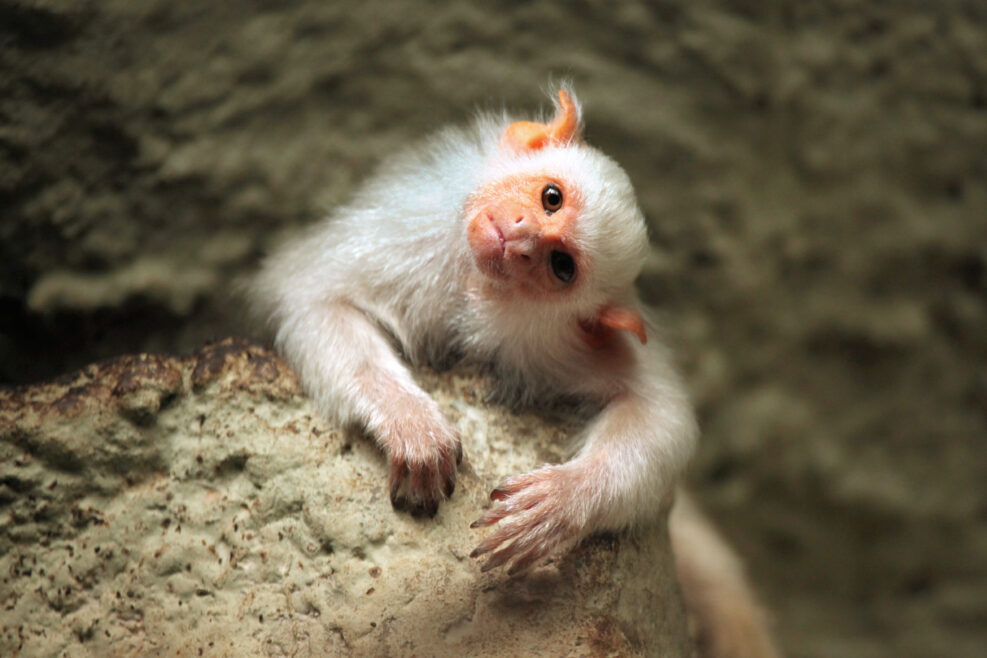
TagDogs


Researchers: Dogs Evaluate How Competent Humans Are
Provided that a treat is involved. Females pay more attention to competence in humans than males, they sayAt Scientific American’s “60-Second Science” podcast (with transcript), science writer Karen Hopkin interviewed Kyoto University psychologist Hitomi Chijiiwa on her team’s recent finding that female dogs actively evaluate human competence. Because one their previous studies showed that dogs avoid people who refuse to help their human friends, the team decided to also test whether dogs form judgments about people based on their apparent skilfulness or competence: Chijiiwa: We showed 60 dogs two persons manipulating transparent containers. One person is competent. Hopkin: That person was able to pop open the top after just a couple of twists. Chijiiwa: Whereas the other person is incompetent and they failed at this task. Hopkin: That person tried to open the lid, then gave up. Read More ›

Human Exceptionalism is a Central Theme for Novelist Dean Koontz
Bestselling author Dean Koontz talks fiction, human exceptionalism, and transhumanism with Wesley J. Smith in new podcast episode (Part II)In Part I of this two-part series, we looked at Dean Koontz’s remarks on the purpose of art and the unique role of the novelist in today’s “everything is political” environment. But that’s not all he and Smith discussed on the Humanize Podcast on September 12th. Both had a lot to say about human exceptionalism, authoritarianism, and also…dogs! Koontz spoke about his love for the pups at the end of the episode, but first, discussed how the “animal rights” movement has gone wrong, and how a materialistic worldview can lead to despair. Smith commented how human exceptionalism is a central theme in Koontz’s novels and asked the reason, to which Koontz responded, “There’s no civilization if we don’t recognize Read More ›

Study: Dogs Cry for Joy as Well as Pain
Recent research has focused on how dogs respond to the world they share with usA recent study looked at dogs reuniting with their human friends: When a person is overcome with emotion, their feelings stream down their cheeks. Even positive emotions can turn on the waterworks, as people bawl when they win awards, express love for their partners, or are reunited with a long-lost friend. But these feelings-driven tears may not be a wholly human experience. Dogs can also cry happy tears, according to a study published today (August 22) in Current Biology. Although the animals’ eyes don’t overflow, they well up when they’re reunited with their owners after spending even just hours apart, the researchers found. And they have hunch as to why: a sudden increase in oxytocin, the so-called love hormone, named Read More ›

Why Do Dogs Understand People Better Than Wolves?
The difference in attitude to humans between dog pups and wolf pups was dramatically demonstrated in a recent studySome enterprising researchers at Duke University decided to compare 44 dog pups with 37 wolf pups, between 5 and 18 weeks of age. Would the wolf pups behave the same way toward humans as the dog pups or differently? While the wolf pups got a lot of human interaction, including hand-feeding, sleeping in their caretakers’ beds and almost round-the-clock human care, the dog puppies lived mostly with their mothers and littermates. They had little human contact. Researchers hid treats in one of two bowls, then gave the dog or wolf a clue to find the food. Sometimes that included pointing and gazing in the direction where the food could be found. Even with no training, dogs as young as 8 Read More ›

Bonobo Chimpanzees Adopt Orphans, a First for Great Apes
But this story is not what it seems. Let’s cut through some pop science assumptions. The real story is a good argument that humans are not just animalsThere’s been a stir recently among primate zoologists around two female bonobos who adopted infants from outside their group: During observations at the Luo Scientific Reserve in Wamba, Democratic Republic of the Congo, the scientists saw the mother bonobos (Pan paniscus) carrying, grooming, nursing, and sharing food with their adoptees, who were in excellent health and treated well by their new social groups. The team’s analysis of DNA extracted from the infants’ faeces confirmed that the youngsters were genetically unrelated to the groups they lived in. “Bonobo mums open their arms to outsider orphans” at Nature Why do they do it? Various explanations are offered: The researchers suggest, “In both cases, adoptees had no maternal kin-relationship with their adoptive mothers. Read More ›

Researchers: Dogs Are Hardwired To Understand Us
Recent research on nearly 400 Labrador puppies reveals a genetic basis for a tendency to look to humans for guidanceConsiderable mystery surrounds the question of why dogs achieve a close emotional relationship with humans. Chimpanzees are genetically very much closer to us but few of us bond with them. So the ability is not obviously genetic — but recent findings point to at least one genetic component: Puppies seem naturally adapted to learn the significance of a common human communication method, pointing: Scientists have known for more than 2 decades that dogs understand the logic behind a surprisingly complex gesture: When we point at something, we want them to look at it. That insight eludes even our closest relatives, chimpanzees, and helps our canine companions bond with us. But it’s been unclear whether pooches acquire this ability simply by Read More ›

Why Do Researchers Wonder Whether Animals Have Personalities?
Every friend of dogs, cats, or birds knows what some researchers struggle to prove. Let’s take a look at what they foundRecently, a research team announced that marmosets — small highly social New World monkeys — display personality traits, whether they are wild or captive: Some individuals were fast to approach any novelty, while others were more careful; hereby showing a similar pattern to humans: for instance, some humans enjoy trying out new restaurants, whereas others prefer to eat in their favorite restaurant. What is more interesting, when comparing personality traits of monkeys in Austria across four years, the authors found that these monkeys are quite consistent in their personality traits (e.g., those that are explorative when they are younger, stay similarly explorative four years afterwards). University of Vienna, “Marmoset Monkeys Have Personalities Too” at Neuroscience News The paper is open Read More ›

Is It Empathy, Not Intellect, That Makes Humans Unique?
Could empathy create intellect, and not the other way around?A Canadian philosopher of mind and language offers a refreshingly thoughtful approach to the uniqueness of human ways of thinking: He reflects on the difference between what is happening when his dog Mackenzie and his eighteen-month-old nephew William bring him an object to play with: For Mackenzie, there is only one game in town. We have been playing it for years, and it never gets old. Sure, I mix things up a bit from time to time. A little sleight of hand can send Mackenzie left while I toss right. Or I fake a throw then hide the ball behind my back, after which I mirror Mackenzie’s stupefied, slightly annoyed look with my own incredulous one. (‘Where did it go?’) Read More ›

Why a Science Fiction Writer Thinks Life Is More Than Just Matter
Many animals and even bacteria show behavior that smacks of thinking, he says
In What Ways Are Cats Intelligent?
Cats have nearly twice as many neurons as dogs and a bigger and more complex cerebral cortexIt’s hard to come up with an interspecies IQ test. We live in a world where dogs are smarter than wolves in some ways but wolves are smarter than dogs in others. So much depends on what we want to measure. So let’s look at cats in relation to dogs because dogs have been studied so much more. Dogs are often seen as smarter than cats because they can do more jobs for humans. But humans bred dogs for millennia to do those very jobs. Cats have also made themselves useful to humans by killing pest rodents. But we best help the cat kill rodents just by getting out of his way. Thus, to assess cat intelligence vs. dog intelligence, Read More ›

In What Ways Are Dogs Intelligent?
There is no human counterpart to some types of dog intelligenceAt Gizmodo recently, George Dvorsky adopted the useful, though somewhat unusual, strategy of determining dog intelligence by focusing on what dogs can’t do. He starts with the premise, as put by University of Exeter psychology professor (and dog expert) Stephen Lea, who says that domestication “has radically altered the intelligence of dogs.” Not so much raised or lowered it as changed its nature from the type of intelligence we would expect from a wolf: “Dogs are very good at what they’re bred to do — they’re excellent at doing those things, and in some cases even better than other species we think are intelligent, such as chimps and bonobos,” Zachary Silver, a PhD student from the Comparative Cognitive Lab at Read More ›

Robot Police Dogs Spark Civil Rights Questions
Boston Dynamics says that its lease agreements require that the robots not be used to “physically harm or intimidate people.”The civil liberties group’s concerns stem from the fact that there are few or no current legal restrictions on how the robots are to be used.
Read More ›
Those Puppy Dog Eyes Are No Accident
The babyface dog is, according to a study of animal shelters, more likely to be adoptedOver thirty-three millennia of selective breeding shaped “a scant, irregular cluster of fibres” found around wolves’ eyes into eyebrows that communicate—to humans—a look-after-me doggy expression.
Read More ›
Does Social Ability Distinguish Human Intelligence from That of Apes?
Not altogether, of course, but it plays a bigger role than we sometimes assumeIn Becoming Human: A Theory of Ontogeny, professor of Psychology and Neuroscience Michael Tomasello tries to understand, from his two decades of research, what makes humans unique. He says that it is not intelligence as such but social intelligence, our “ultra social ability”: One of our most important studies was a huge study we did with over 100 human children and over 100 chimpanzees. We gave them a big battery of tests – a big IQ test if you will. It covered understanding of space, causality, quantities, as well as social learning, communication, reading the intentions of others. We found that 2-year-old children – before they can read or do anything mathematical – look just like the apes on physical Read More ›
